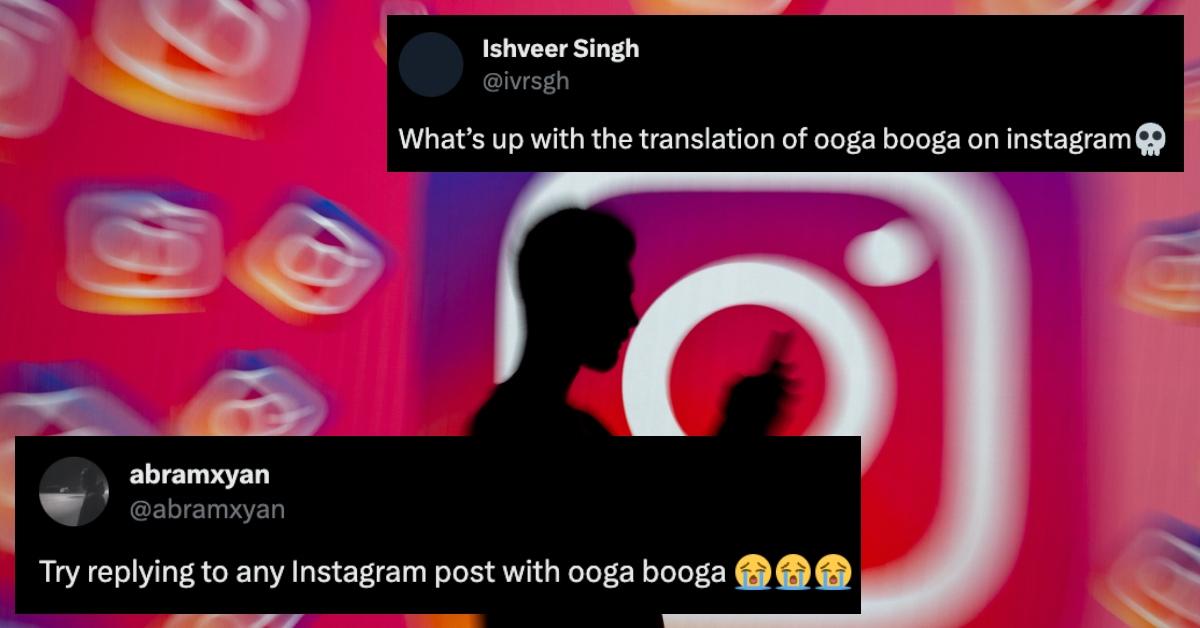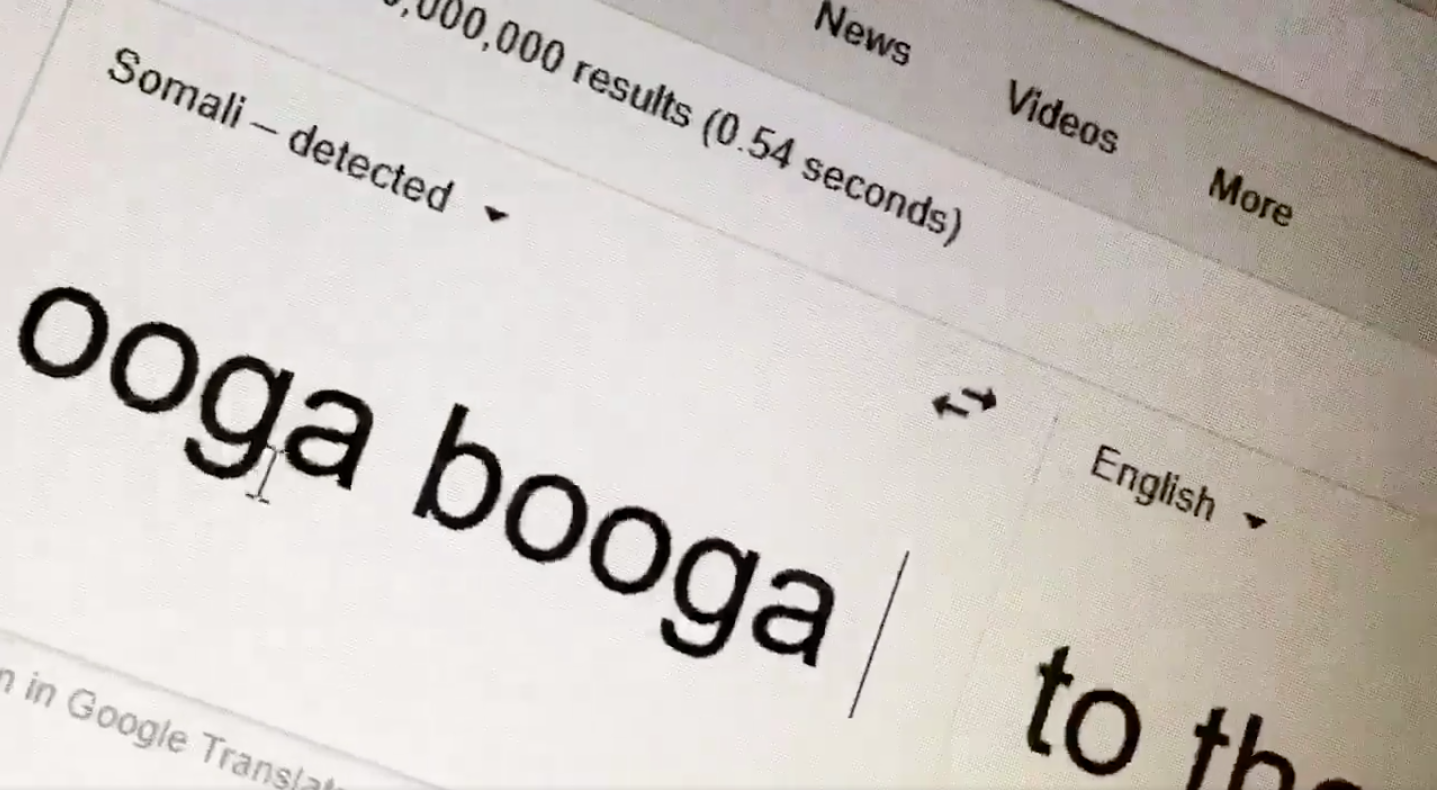Topic translate ooga booga: Explore the intriguing phrase "translate ooga booga," its historical roots, cultural significance, and the diverse interpretations that it holds in today"s digital age.
Table of Content
- How can I translate the phrase ooga booga accurately on Google?
- Origins and Meaning of \"Ooga Booga\"
- Controversy and Misuse in Modern Contexts
- Instances on Social Media Platforms
- Automatic Translations and Misinterpretations
- YOUTUBE: Google Translate: Ooga Booga Alphabet Translation
- Cultural Sensitivity and Public Reactions
- Legal Implications and User Warnings
- Alternative Expressions and Respectful Communication
How can I translate the phrase ooga booga accurately on Google?
To accurately translate the phrase \"ooga booga\" on Google, you can follow these steps:
- Open the Google Translate website (https://translate.google.com)
- Click on the \"From\" dropdown menu and select the language of the phrase you want to translate. For example, if \"ooga booga\" is in English, select \"English\" from the list.
- Click on the \"To\" dropdown menu and choose the target language you want to translate the phrase into.
- Type or paste the phrase \"ooga booga\" into the text box.
- Google Translate will automatically detect the input language, but you can double-check if it\'s correct.
- Wait for the translation to appear in the text box below. The translated phrase will be displayed in the selected language.
- Review the translated phrase and make sure it accurately represents the meaning of \"ooga booga\" in the target language.
- If you need to translate it into a different language, you can repeat steps 3 to 7 with the new target language.
- You can also click on the speaker icon next to the translated phrase to hear the pronunciation.
This process will allow you to obtain an accurate translation of the phrase \"ooga booga\" on Google Translate.
READ MORE:
Origins and Meaning of \"Ooga Booga\"
The phrase \"ooga booga\" is often perceived as nonsensical or primitive language, originating from vintage cartoons and movies to mimic the sounds attributed to indigenous or tribal languages. Its usage reflects a broad, often incorrect, portrayal of ancient or tribal communications. While the term lacks a specific linguistic origin, it has been widely used in popular culture to evoke a sense of the exotic or the otherworldly, often in a humorous or derogatory manner.
Historically, \"ooga booga\" has been associated with stereotypical and simplistic depictions of tribal societies in early 20th-century media. It\"s important to understand that such representations are not accurate and can be seen as offensive by modern standards. The phrase\"s adoption into popular vernacular showcases the evolution of language and the impact of media on perceptions of different cultures.
In contemporary contexts, the term may be used in a variety of ways, ranging from playful banter to derogatory slurs. It\"s crucial for users of the phrase to be aware of its implications and the potential for misunderstanding or offense.
- Evolution in Media: How \"ooga booga\" transitioned from early cinematic portrayals to internet memes.
- Cultural Sensitivity: The importance of understanding the background and implications of using such phrases.
- Modern Usage: A look at how \"ooga booga\" is used today across different platforms and contexts.
Understanding the origins and meanings behind \"ooga booga\" is key to appreciating the complexities of language and cultural representation in media. By exploring its history, we can better understand the impact of our words in diverse social contexts.

Controversy and Misuse in Modern Contexts
The phrase \"ooga booga\" has become a subject of controversy due to its misuse and the potential to perpetuate stereotypes and racism. Its origins and seemingly harmless use in popular culture obscure the deeper issues of cultural insensitivity and misrepresentation. In modern contexts, the term\"s application can have varying implications, highlighting the need for a nuanced understanding of language and its impact.
- Impact on Communities: The phrase can be offensive to indigenous and African communities, as it mimics caricatured versions of their languages and cultures.
- Media Representation: How movies, television shows, and online platforms have contributed to the controversial nature of \"ooga booga\" through thoughtless usage.
- Public Perception: The way in which the term is perceived by different groups, including those who may use it jokingly without understanding its historical baggage.
The controversy surrounding \"ooga booga\" serves as a reminder of the importance of cultural sensitivity and the power of words to harm or marginalize. It is crucial for content creators, social media users, and the public at large to recognize the potential implications of using such terms, especially in an era where digital communication can amplify and spread stereotypes rapidly.
Efforts to educate and raise awareness about the problematic aspects of \"ooga booga\" and similar phrases are vital in promoting respectful and thoughtful communication. By acknowledging the term\"s controversial aspects and striving for more informed language use, individuals and communities can contribute to a more inclusive and understanding society.

Instances on Social Media Platforms
Social media platforms have witnessed the widespread use of the phrase \"ooga booga,\" showcasing its varied interpretations and applications in digital communication. The phrase\"s presence on these platforms reflects the broader conversations around language, culture, and the digital sharing of ideas.
- Use in Memes: \"Ooga booga\" has been adopted in internet memes for comedic effect, often without awareness of its historical connotations.
- Online Communities: Within various online forums and communities, the phrase is used to signal in-group belonging or shared cultural references.
- Hashtags and Trends: On platforms like Twitter and Instagram, hashtags involving \"ooga booga\" emerge in trends, sometimes sparking discussions about its appropriateness and meaning.
While instances on social media can amplify the phrase\"s reach and influence, they also open avenues for dialogue about its use and the importance of context in digital communication. Social media users, influencers, and platform moderators play crucial roles in navigating the balance between freedom of expression and the responsibility to avoid perpetuating stereotypes or offending cultural sensibilities.
Efforts to understand the nuances of \"ooga booga\" within social media contexts underscore the dynamic nature of language and culture in the digital age. By engaging with these instances thoughtfully, the online community can foster a more inclusive and respectful discourse.

Automatic Translations and Misinterpretations
In the era of global digital communication, automatic translation tools have become essential for bridging language barriers. However, phrases like \"ooga booga,\" with their complex histories and cultural connotations, pose unique challenges for these technologies, often leading to misinterpretations or oversimplifications.
- Lack of Context: Automatic translators struggle to grasp the cultural and historical context behind \"ooga booga,\" resulting in literal translations that miss the phrase\"s nuanced meanings.
- Algorithmic Limitations: Translation algorithms may not recognize \"ooga booga\" as a phrase requiring careful handling, inadvertently perpetuating stereotypes or offending users.
- User Misunderstandings: Reliance on automatic translations can lead to misunderstandings among users who receive inaccurate or culturally insensitive translations of the phrase.
These challenges highlight the importance of human oversight in the translation process, especially for phrases steeped in cultural significance. Developers and linguists are working to improve translation technologies to better recognize and handle such nuanced language use. By incorporating cultural sensitivity into automatic translations, technology companies can help minimize misinterpretations and foster more accurate cross-cultural communication.
As users, being aware of the limitations of automatic translations and approaching them with a critical eye is crucial. This awareness can lead to more meaningful exchanges and a deeper appreciation for the complexity of languages and cultures in our interconnected world.

_HOOK_
Google Translate: Ooga Booga Alphabet Translation
Learn about the fascinating journey of the Alphabet in this captivating video! Unravel the origins and evolution of the letters that form the foundation of our written language. Join us on this educational exploration!
Cultural Sensitivity and Public Reactions
The phrase \"ooga booga\" has sparked discussions about cultural sensitivity and the need for mindfulness in language use. Public reactions to the phrase underscore the evolving understanding of cultural respect and the impact of words on community relations.
- Increased Awareness: There is a growing recognition of the importance of cultural sensitivity, with more individuals and organizations acknowledging the potential harm caused by careless language use.
- Community Responses: Communities affected by the misuse of \"ooga booga\" have voiced their concerns, leading to broader conversations about respect, representation, and the power of language.
- Policy Changes: Some media companies and social platforms have implemented policies to address and prevent the use of culturally insensitive language, reflecting a commitment to more respectful communication.
These developments indicate a shift towards greater cultural awareness and a collective effort to foster an inclusive environment where all voices are respected. The public\"s reaction to \"ooga booga\" and similar phrases plays a crucial role in highlighting the need for continuous dialogue and education on cultural sensitivity.
Embracing cultural diversity and understanding the historical context of language can lead to more meaningful interactions and a deeper appreciation for the richness of global cultures. By prioritizing empathy and respect in communication, society can move towards eliminating stereotypes and fostering mutual respect.

Google Translate: Singing The Ooga Booga Alphabet
Prepare to be enchanted by the beautiful art of singing in this enchanting video! From soaring melodies to heartwarming harmonies, discover the power of the human voice and the joy it brings. Immerse yourself in the world of music and let your soul be uplifted!
Legal Implications and User Warnings
As the digital landscape evolves, the use of phrases like \"ooga booga\" in public forums and social media can have legal implications, reflecting the increasing importance of responsible communication online. Understanding these potential consequences is crucial for users and content creators alike.
- Hate Speech Regulations: In some jurisdictions, the use of derogatory or racially insensitive language, including \"ooga booga,\" may fall under hate speech laws, leading to legal action.
- Platform Policies: Social media platforms and online communities have their own guidelines regarding offensive language, and the misuse of phrases like \"ooga booga\" could result in content removal or account suspension.
- User Education: Many platforms now offer resources to educate users about the impact of their words, encouraging a more respectful online environment.
These legal implications and user warnings serve as reminders of the responsibilities that come with the freedom of online expression. By being mindful of the words we use and their potential impact, individuals can contribute to a safer, more inclusive digital community.
Moreover, the legal landscape encourages a broader discussion about the balance between free speech and respect for others, highlighting the need for ongoing education and dialogue about cultural sensitivity and online behavior.

READ MORE:
Alternative Expressions and Respectful Communication
In the pursuit of respectful and inclusive communication, finding alternative expressions to potentially offensive phrases like \"ooga booga\" is essential. This not only demonstrates cultural sensitivity but also enriches our language use by embracing diversity and understanding.
- Culturally Neutral Language: Opting for language that does not reference specific cultures or ethnic groups in a derogatory manner promotes inclusivity and respect.
- Positive Reinforcement: Using phrases that affirm and celebrate cultural diversity can contribute to a more welcoming and positive communication environment.
- Education and Awareness: Educating oneself and others about the origins and implications of certain expressions can lead to more informed and considerate language use.
By adopting alternative expressions and prioritizing respectful communication, individuals and communities can foster an atmosphere of mutual respect and understanding. This approach not only avoids potential offense but also encourages a richer, more diverse dialogue that reflects the complexities and beauties of our global community.
Encouraging the use of language that is inclusive and mindful of historical and cultural contexts can significantly impact how communities interact and understand each other. This shift towards more thoughtful communication is a key step in building a more empathetic and united society.
Exploring the phrase \"translate ooga booga\" reminds us of the power of words to connect, educate, and sometimes divide. Let\"s choose our words wisely, fostering respect and understanding in our global conversation.









